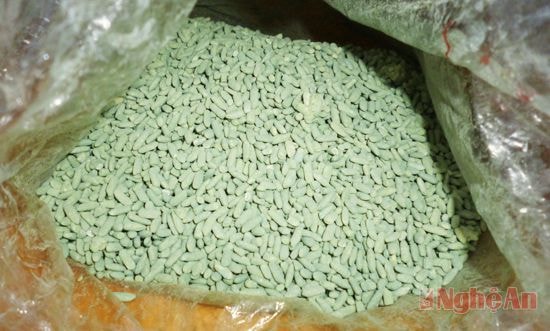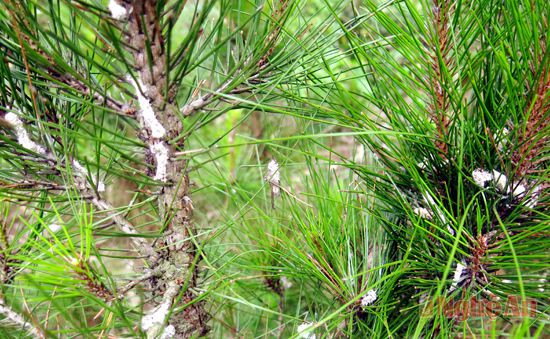Pest control with biological products
(Baonghean) - To overcome the consequences of using pesticides, in recent years, a number of research projects have applied fungi to become biological products that are effective in preventing pests and diseases on crops. This method contributes to reducing environmental pollution and protecting people's health.
In recent years, brown planthoppers, black-tailed green planthoppers, and white-backed planthoppers (collectively called rice planthoppers) have been causing damage to rice plants. Although the severity varies, every year and every rice crop, planthoppers arise and cause damage, with some years causing major epidemics that cause serious damage. Planthoppers not only cause direct damage to rice plants, but more dangerously, brown planthoppers are also the intermediate vectors of yellow dwarf disease, leaf curl dwarf disease, and white-backed planthoppers are the vectors of Southern black-striped dwarf disease. There is currently no specific medicine for this. To prevent diseases on rice plants, in our country, research and application of green fungi to prevent inchworms, coconut beetles, brown planthoppers, stink bugs, rice stem-eating worms, omnivorous worms, and aphids is quite common. Some localities in the Mekong Delta have applied Luc Cuong mushroom production technology to prevent pests and diseases, which has been popularized to farmers, bringing high efficiency.
 |
| Green mushroom preparation. |
In Nghe An, in 2012, the Center for Forest Resources and Environment Protection conducted research and application, producing the green mushroom preparation Metar-NA from natural sources in the area to prevent brown planthoppers in some localities such as Van Dien (Nam Dan), Xuan Son (Do Luong), Hung Phuc (Hung Nguyen). The initial results were quite good, the effectiveness of controlling planthoppers reached 60 - 75%. Mr. Hoang Ngoc Quynh's family - Hamlet 9, Hung Phuc commune (Hung Nguyen) has 15 sao of rice. Since 2012, Mr. Quynh's family has used pesticides derived from Luc Cuong mushroom preparation to spray and control rice planthoppers. Mr. Quynh shared: “In 2012, our rice fields were affected by brown planthoppers, so we used Luc Cuong mushroom to spray to prevent them. It was very effective and non-toxic. In 2013, the fields around here were affected by planthoppers, but my field was not. This year, planthoppers have started to appear, and I am also spraying this product to prevent them.”
Not only researching and applying fungi to prevent brown planthoppers on rice plants, the Nghe An Forestry Science and Technology Association has also successfully tested biological products to prevent caterpillars that harm pine. Nghe An currently has about 31,000 hectares of pine forests distributed in 10 districts. Pine forests are often infested with pine caterpillars, which not only affect growth and development, damage forest resources, but also affect the economy, society, environment and landscape. Pine is a tall plant, caterpillars often live and cause damage on the foliage, and spraying is quite difficult because the chemicals must be dissolved in water before spraying.
This method requires the sprayer to stand under the pine forest canopy to spray the pesticide high up, the possibility of the pesticide contacting the pests is very low. Meanwhile, the sprayer is susceptible to these chemical parts falling on the body, affecting the health. Understanding these disadvantages in the prevention work, Nghe An Forestry Science and Technology Association has overcome by using the biological product Boverin-Na in powder form. With this fine powder biological product, the ingredients only contain fungal spores and agricultural products, so it does not affect the sprayer at all. On the other hand, when spraying on the foliage from below, because the spores are in powder form, they are easily dispersed by the wind to the upper leaf layers, making faster contact with caterpillars, improving the effectiveness of pest control.
 |
| The effectiveness of Bo-Ve-Rin NA on pine caterpillars. |
The process is quite simple with available, cheap raw materials and production supplies from agricultural products. The biological product Boverin-Na has been used to prevent pine caterpillars in pine forests in Do Luong, Nam Dan, Nghi Loc, and Yen Thanh districts. "We have used Boverin-Na to spray to prevent pine caterpillars in recent years, with good prevention efficiency. When the caterpillars pupate, they are parasitized by many natural enemies, especially the return cycle of the caterpillars is very low, the next cycle is almost never seen" - Mr. Le Dinh Minh - Head of the Management Board of Special Use Forests of Nam Dan district said.
Using biological products in pest control is no longer a new topic, but this is one of the directions to ensure a safe and sustainable agriculture. However, currently the development of these biological products still faces many difficulties because there is no preferential policy mechanism, encouragement to create conditions for research, development, and application of biological products to protect crops, reducing toxic chemical products.
To apply these advances in mass production, it is necessary to have the participation of units and localities as well as to guide people to clearly understand the effects of biological products in agricultural production and environmental protection.
Vinh Thao
Provincial Radio






